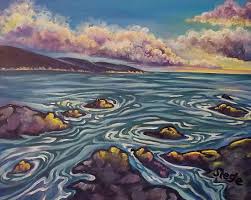 The Yogabliss on-line Moving into Meditation classes met this morning. We explored how our senses guide us into kinship. In our “inter-relationships” we allow the world inside us. We also offer ourselves up to the world. We bring intimate attention to this experience of being alive. Deep listening can sustain us in the present as the past continues to live and our futures are formed.
The Yogabliss on-line Moving into Meditation classes met this morning. We explored how our senses guide us into kinship. In our “inter-relationships” we allow the world inside us. We also offer ourselves up to the world. We bring intimate attention to this experience of being alive. Deep listening can sustain us in the present as the past continues to live and our futures are formed.
We drew on the wondrous work of David George Haskell: Sounds Wild and Broken. We head from the Emergence Magazine interview: Listening and the Crisis of Inattention. This is a conversation that “touches on the legacies of kinship that are present when we listen, and how deep experiences of beauty can serve as a moral guide for the future. ”
We heard from Mary Oliver’s poem, At the River Clarion, from her Devotions collection. Mary hears the river speaking to her. “Said the river I am part of holiness.” Like David, Mary calls for our intimate attention and deep caring. Both writers encourage embracing our senses as a way of engaging the world.
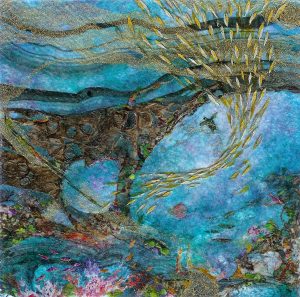 Social activist Valarie Kaur reminds us that: “Deep listening is an act of surrender. We risk being changed by what we hear.” You can “hear” Valarie’s vibrant voice in her film, Divided We Fall. You can read her memoir, See No Stranger.
Social activist Valarie Kaur reminds us that: “Deep listening is an act of surrender. We risk being changed by what we hear.” You can “hear” Valarie’s vibrant voice in her film, Divided We Fall. You can read her memoir, See No Stranger.
Guided Reflection
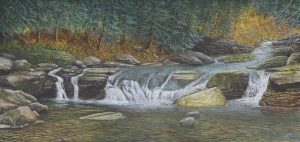 Welcome. Here we are in the heart and heat of summer. I invite you to feel your body. Notice where your awareness lands. Can you be with this experience? Can you allow the flow of life to move through your being? Notice if your mind is working on something. Your heart may be expressing feeling. How do you experience these states with your senses? I invite you to explore how sensing arises in relationship between our bodies and Earth’s living environment.
Welcome. Here we are in the heart and heat of summer. I invite you to feel your body. Notice where your awareness lands. Can you be with this experience? Can you allow the flow of life to move through your being? Notice if your mind is working on something. Your heart may be expressing feeling. How do you experience these states with your senses? I invite you to explore how sensing arises in relationship between our bodies and Earth’s living environment.
I invite you to sense the areas touching and being touched by Earth. Sense the air on your skin, the breath moving through your nostrils. Is there a scent? Feel the moisture in your mouth. Is there a taste? You might open your eyes. Try focusing narrowly and then broadly. How do you experience images and light? Notice what you hear and how you listen.
Naturalist David Haskell writes about sound and how it has evolved through time:
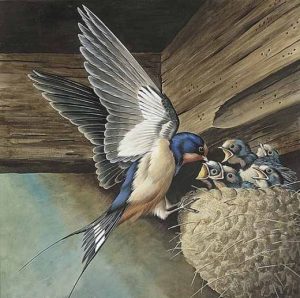 . . . life is about relationship and connection. Without connection, every living being withers and dies. And what does that connection entail? It involves the senses. How do we get food into our bodies? Through the sense of smell and taste and through tactile senses. How do we connect to one another as humans? Through spoken language, through music. How do we learn about the rest of the world?
. . . life is about relationship and connection. Without connection, every living being withers and dies. And what does that connection entail? It involves the senses. How do we get food into our bodies? Through the sense of smell and taste and through tactile senses. How do we connect to one another as humans? Through spoken language, through music. How do we learn about the rest of the world?
Through being embodied creatures.
In meditation we bring our intimate attention to the experience embodiment. We sit with our vulnerability and strength. The first step is to allow ourselves to feel. In feeling, there is a sense of unknowing and knowing. The Zen phrase, “not knowing is most intimate,” expresses the kinship we have with life. The world draws us in through our senses. Curiosity and feeling express our aliveness.
David writes:
Time is the place where kinship comes from. As biologists, we look back into time to find kinship. That’s true of our own families, right? We find our sisters and brothers and cousins who are related to us through relationships that happened in the past, and the same is true with a deeper kinship. So looking and listening, particularly back into deep time, it is extraordinary that you can go to a mountaintop now, or a seashore or a rushing river, and hear sounds almost exactly as they have been for billions of years.
In her poem, At the River Clarion, Mary Oliver describes how we experience kinship by listening deeply to the world around us. She writes:
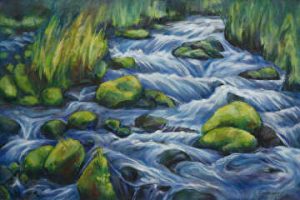 I don’t know who God is exactly.
I don’t know who God is exactly.
But I’ll tell you this.
I was sitting in the river named Clarion, on a water splashed stone
and all afternoon I listened to the voices of the river talking.
Whenever the water struck a stone it had something to say,
and the water itself, and even the mosses trailing under the water.
And slowly, very slowly, it became clear to me what they were saying.
Said the river I am part of holiness.
And I too, said the stone. And I too, whispered the moss beneath the water.
I’d been to the river before, a few times.
Don’t blame the river that nothing happened quickly.
You don’t hear such voices in an hour or a day.
You don’t hear them at all if selfhood has stuffed your ears.
And it’s difficult to hear anything anyway, through all the traffic, the ambition.
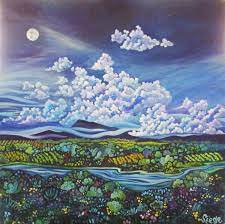 . . . Said the river: imagine everything you can imagine, then keep on going.
. . . Said the river: imagine everything you can imagine, then keep on going.
Imagine how the lily (who may also be a part of God) would sing to you if it could sing, if you would pause to hear it.
Let us listen to the world around us with the intimacy of not knowing and deeply caring.
I invite you to feel your body. Notice where your awareness lands. I invite you to sense the areas touching and being touched by Earth. What or who are you relating to through your senses? Perhaps you’ve seen, heard or touched someone or something that’s moved you. You might have shared these feelings with those of us here today. You might have heard their stories. Activist Valarie Kaur reminds us that:
Deep listening is an act of surrender. We risk being changed by what we hear.
There is poetry, song and story within us and all around us. Our practice is an invitation to hear and feel and touch the world. We are creatures of the past, alive in the present and forming the future. We are part of the deep time in which the quiet growth of plants make sounding creatures possible.
David Haskell reminds us that:
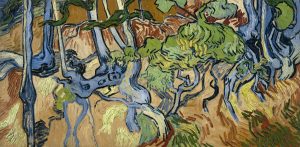 . . . the senses are essential, not just for the thriving of life, but for us to be good neighbors and kin. If we’re not listening, how can we possibly attempt to be a good neighbor to brother and sister wolf, to the whales in the ocean, to the birds in the forests? If we’re not paying attention through our own senses, we have disengaged from the primary mode in which every creature since the origin of life has connected to its environment. And if we’re not listening, we’ve got no stories to tell the future.
. . . the senses are essential, not just for the thriving of life, but for us to be good neighbors and kin. If we’re not listening, how can we possibly attempt to be a good neighbor to brother and sister wolf, to the whales in the ocean, to the birds in the forests? If we’re not paying attention through our own senses, we have disengaged from the primary mode in which every creature since the origin of life has connected to its environment. And if we’re not listening, we’ve got no stories to tell the future.
The experience of sensing is inter-relational. There is a reciprocity in relationship, an exchange whose effects may live beyond our time. David writes:
. . . We pay attention in our everyday world and listen for what is beautiful and broken around us, but also, we reach out in solidarity to the people who are living in tropical forests, or people who know of the ecosystems on which we depend, and ask: What are you sensing? What can I learn from you? What do you need from me to help you in your work and your struggle? . . . [W]e have the challenge of . . . : being attentive to the everyday world around us, and also attentive to what is beyond the horizon . . .
Our practice calls us to listen and respond. We are called to reach out and learn. We are called to love the world beyond the horizon. Mary Oliver again:
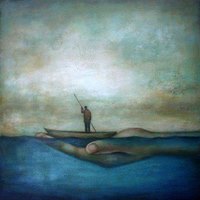 Yes, it could be that I am a tiny piece of God, and each of you too, or at least of his intention and his hope.
Yes, it could be that I am a tiny piece of God, and each of you too, or at least of his intention and his hope.
Which is a delight beyond measure.
I don’t know how you get to suspect such an idea.
I only know that the river kept singing.
It wasn’t a persuasion, it was all the river’s own constant joy
which was better by far than a lecture, which was comfortable, exciting, unforgettable.
3.
Of course for each of us, there is the daily life.
Let us live it, gesture by gesture.
When we cut the ripe melon, should we not give it thanks? And should we not thank the knife also?
We do not live in a simple world.
[. . .]
5.
My dog Luke lies in a grave in the forest, she is given back. But the river Clarion still flows from wherever it comes from to where it has been told to go.
I pray for the desperate earth.
I pray for the desperate world.
I do the little each person can do, it isn’t much.
Sometimes the river murmurs, sometimes it raves.
[. . .]
7.
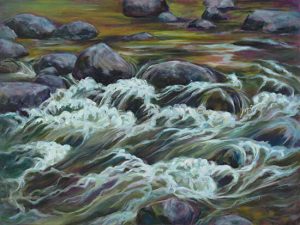 And still, pressed deep into my mind, the river keeps coming, touching me, passing by on its long journey, its pale, infallible voice
And still, pressed deep into my mind, the river keeps coming, touching me, passing by on its long journey, its pale, infallible voice
singing.
May we listen deeply to rivers, forests, plants and fungi. May recognize them as kin. May we do the little each person can do.
